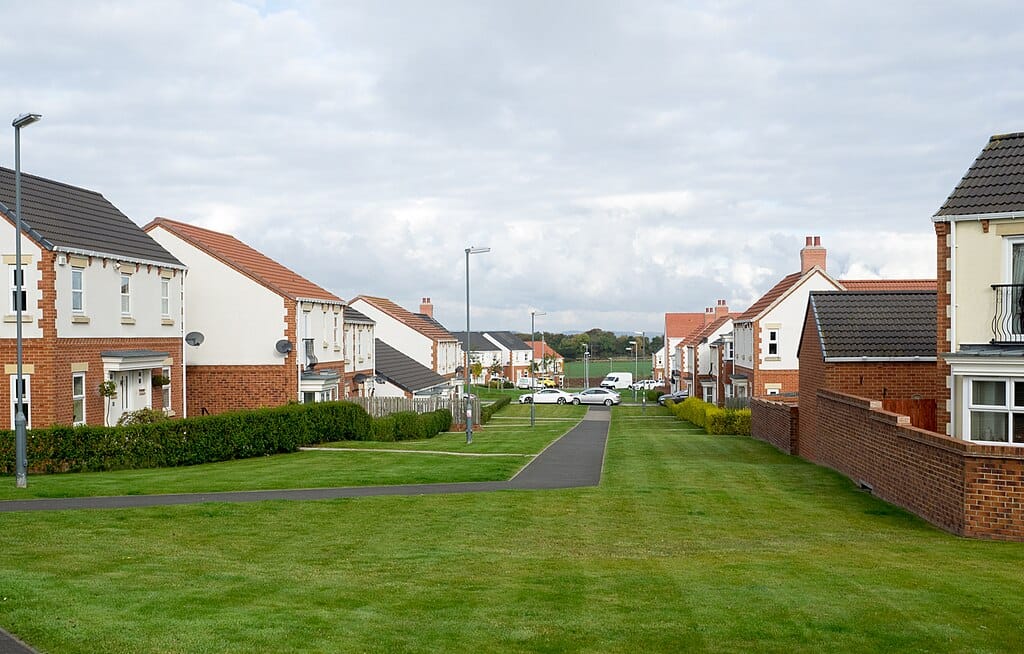urban / suburbs / suburbia / burbs

The typical path of a term’s development is the appearance of the root, then the root is added to, through compounding, adding affixes (i.e., derivation), or some other means. Then it may be clipped to shorter form. But urban / suburban reverses this usual order. We see the clipped suburbs first, then urban comes along some centuries later.
The root of all these words is the Latin noun urbs, meaning city, and specifically the city of Rome. From this noun comes the adjective urbanus. And there is the Latin adjective suburbanus, referring to the environs surrounding a city. In Latin, the word’s development followed the usual path, root then root plus affixes.
But in English, we first see the clipped form suburbs. It first appears in a c. 1350 translation of the Deuteronomy 32:32 in the Midland Prose Psalter:
For our God nis nouȝt as her goddes, and our enemis ben iuges. Her uines is of þe uine of Sode-mens & of þe suburbes of Gomorre. Her grape is grape of gall, & her berye hys bitterest.
(For our God is not as their gods, and our enemies are judges. Her vines are the vine of Sodom & of the suburbs of Gomorrah. Their grapes are the grapes of gall, and their berries are the bitterest.)
The Latin Vulgate of this verse uses suburbanis.
But urban doesn’t make its English appearance until over two hundred years later, in Alexander Garden’s 1619 verse life of William Elphinstone, bishop of Aberdeen (1431–1514):
And suche viuacitie of spreit,
Was he indew'd withall.
That nothing laicking feem’d
That needs concerne, or can
Be fitting for ane priuat, or
A publick placed man.
Vrban and tunishe turns,
Or for the land's effairs,
Or what soeu'r besyd, his wit
Him fit for all declairs.
Note that Garden is associating the city with things that are fashionable (tunishe or tonish), a connotation that continues to this day.
There are further variations on the words. We get the faux-Latin suburbia in the late nineteenth century. Here is an example from a theater review that appears in the London newspaper the Era on 9 October 1870:
A new farce by Mr. Conway Edwardes, entitled Board and Residences, commenced the entertainments. It is a light and bustling affair enough. Miss Matilda Mildew, a spinster of middle age, keeps a boarding-house in Tranquil-terrace, Suburbia.
And the slangish clipping the burbs is in place by 1977. From an article on urban farming in the Washington Post of 11 December of that year:
Regardless, for most homesteaders, there must be another source of income, and that requires, in the vast majority of cases, close proximity to an urban environment. Some, like General Motors heir Stewart Mott, for several years a chicken-farmer on his Manhattan rooftop, have found ways of adding a rural flavor to an essentially urban existence. Others are buying the American dream of a house in the burbs and two cars in the garage—and then adding a new dimension.
Sources:
Bülbring, Karl D., ed. The Earliest Complete English Prose Psalter, part 1. Early English Text Society. London: Kegan Paul, Trench, Trübner, 1891, 188. London, British Library, MS Additional 17376. HathiTrust Digital Archive.
Cook, Adrienne. “The Urban: Farmstead.” Washington Post, 11 December 1977, Magazine 25/2. ProQuest Historical Newspapers.
Garden, Alexander. The Lyf, Doings, and Deathe of The Right Reuerend and Worthy Prelat, William Elphinstoun (1619). In A Theatre of Scottish Worthies. Glasgow: R. Anderson, 1878, 71. HathiTrust Digital Archive.
Middle English Dictionary, 8 February 2025, s.v. suburban, n., suburb(e, n.
Oxford English Dictionary, third edition, March 2002, s.v. ‘burb, n.; June 2012, s.v. suburban, n. & adj., suburb, n., suburbia, n.; June 2011, s.v. urban, adj. & n.
“Town Edition.” Era (London), 9 October 1870, 13/1. Gale Primary Sources: British Library Newspapers.
Image credit: Trevor Littlewood, 2015. Wikimedia Commons. Licensed under a Creative Commons Attribution-Share Alike 2.0 Generic license.